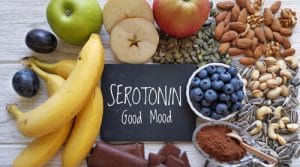Serotonin is a chemical produced by your nerve cells. This important signaling molecule is a messenger between the nerve cells in your body. Serotonin lives throughout the digestive system, in blood platelets, and in your entire central nervous system.
The body also produces serotonin from tryptophan, an amino acid found in red meat, nuts, and cheese. A person with tryptophan deficiency may also experience decreased serotonin levels. When your serotonin levels are low, you may experience a variety of mood disorders, including depression and anxiety.
What is Serotonin Used For?
Serotonin impacts every system in the body. It can affect emotions, motor skills, physical health, and more. Serotonin is a natural mood stabilizer that helps digestion, eating, and sleeping. Let’s examine the different ways the body uses serotonin.
- Bowel Movements—Serotonin is primarily found in the stomach and intestines and used by the digestive system to control bowel movements and digestion. Serotonin can also reduce your appetite and help you recognize when they are full.

- Mood—The brain uses serotonin to regulate mood. With low serotonin levels, a person is at an increased risk of experiencing depression.
- Toxin Protection—If a person consumes a toxic or irritating substance, the body increases its serotonin production. This extra serotonin helps move the offending food through the digestive tract, allowing the body to expel it quickly through vomiting or diarrhea.
- Sleep—Serotonin stimulates the areas of the brain that control waking and sleeping patterns. Stimulation of various serotonin receptors can promote sleepiness or wakefulness.
- Blood Clotting—The body uses serotonin to aid in wound healing. After an injury, the body releases serotonin to narrow the blood vessels in the area, aiding blood clotting to staunch the bleeding.
- Bone Health—Serotonin can impact bone health. If your serotonin levels are too high, osteoporosis can develop, weakening bones and causing bone loss.
- Mental Health—Serotonin helps regulate your mood. It enables your brain cells to communicate with other cells in your nervous system. When your brain does not have enough serotonin, it can decrease your mood and eventually lead to depression. Conversely, too much serotonin in the brain can increase nerve cell activity, which can increase the risk of anxiety.
- Sexual Function—Researchers have associated low serotonin levels with increased libido. Conversely, increased serotonin levels can reduce libido and lead to decreased sexual function and desire.
Balancing Serotonin Levels
- When your serotonin levels are balanced, you will feel happier, less anxious, and calmer. You will be emotionally stable and experience improved focus. Learning how to balance your serotonin levels can help improve your mood and reduce many of the symptoms associated with an unbalanced level of serotonin in the body.
There are several ways that your serotonin levels can be increased, including medications and natural options.
- SSRIs – SSRIs (selective serotonin reuptake inhibitors) are medications prescribed to treat depression. SSRIs are antidepressants that work by blocking the reabsorption of serotonin in the brain.
- SNRIs—SNRIs (serotonin-norepinephrine reuptake inhibitors) are another type of antidepressant that blocks the reuptake of serotonin. However, they also impact norepinephrine levels in the body. Doctors often refer to this type of medication as a dual-acting antidepressant.
Serotonin is often called the happy neurotransmitter because of the mental health benefits offered. If your serotonin levels are low, you can experience depression and other mood disorders. Luckily, there are several things you can do to improve your serotonin levels naturally.
- Exercise—Regular exercise helps the body produce neurotransmitters, including serotonin and Dopamine. Most experts recommend getting at least 30 minutes of moderate exercise daily to improve mood and increase energy.
- Diet—Eating a healthy diet with foods rich in tryptophan can help increase serotonin levels naturally. The best foods include turkey, cheese, nuts, eggs, pineapple, tofu, and salmon.
- Meditation is a stress relief technique that can decrease stress levels and promote a positive outlook. Daily meditation can also naturally improve serotonin levels and mood.
- Massage—Massage therapy can help reduce cortisol levels and naturally promote serotonin production. This hands-on technique relieves depression and anxiety while relaxing the body, mind, and spirit.
- Probiotics – Many researchers believe that your gut microbiota can impact your serotonin levels. Eating fermented foods and taking a probiotic supplement may help to increase your body’s production of serotonin and improve your mood.
While serotonin is present throughout your body, it is generally considered a brain chemical. Research has determined that approximately 95 percent of serotonin is in the gastrointestinal tract. Our functional medicine providers understand serotonin and that balancing this important mood chemical requires a holistic approach. Our team will evaluate your diet, lifestyle, digestive health, nutrients, and much more to ensure you are optimizing your serotonin levels for optimal health.
























